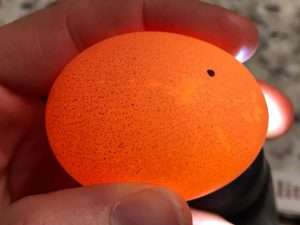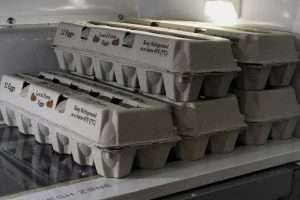“I realized that a homestead was not about fancy twists on traditional items,” owner and farmer Christopher Griggs said about his farm-sourced products at Homestead 1870. “It was more about simplicity.”
“Simplicity” is a far cry from “easy,” and Griggs wouldn’t have it any other way. His idyllic property in Purcellville, Va., actually supports a range of separate business types, including a bed and breakfast, wedding and events venue, farm store and, of course, a working farm.
His value-added products vary over time and include everything from caramel corn and soap to beignets and hand-crafted sodas. Still, one of his most popular items is one of his simplest: farm fresh eggs.
Available right now on the Loudoun Made Loudoun Grown Marketplace, Homestead 1870 eggs cover every hue from pearly white to dark chocolate, hitting notes of green, pink and blue in between. Egg color in chickens is determined by the breed, with the pigment from blue eggs being inserted into the shell, while brown coloring is deposited on top of the formed egg.
Green eggs are usually a combination of a blue egg covered in some level of brown pigmentation. All hens at Homestead 1870 are pasture-raised, non-GMO. Every egg that Griggs sells has also been in the “spotlight.”
Candling Eggs at Homestead 1870
 “Before I put the eggs out to sell, I candle them. Candling them is essentially grading them,” he explained, which involves holding a very bright light up to the far side of the egg and looking for abnormalities. “There are a few things to look for when checking eggs.
“Before I put the eggs out to sell, I candle them. Candling them is essentially grading them,” he explained, which involves holding a very bright light up to the far side of the egg and looking for abnormalities. “There are a few things to look for when checking eggs.
“The first thing I look at is the size of the bubble. The bubble should be small, the size of a nickel or dime. The larger the bubble, the older the egg. Over time, the bubble grows, which eventually allows an egg to float (and go bad).
“The next thing I look for are cracks in the shell. Cracks are not always visible to the eye, just like in the photos. I marked the outside of the egg with a black dot to identify the area of the crack. Notice how you cannot see the crack without candling. No cracked eggs are ever sold.
“Lastly, I look for anything discolored, or dark, which can be from a range of things. Eggs are passed through the body, and sometimes, things just happen. When it’s a baby chick, it is quite obvious.”
Should You Refrigerate Eggs?
 Did you know? Refrigerating eggs is a relatively new phenomenon and one that is uniquely American, thanks to the standards outlined by the Food and Drug Administration. Our friends across the pond in the U.K. generally leave eggs in the pantry, as do many Americans with backyard flocks.
Did you know? Refrigerating eggs is a relatively new phenomenon and one that is uniquely American, thanks to the standards outlined by the Food and Drug Administration. Our friends across the pond in the U.K. generally leave eggs in the pantry, as do many Americans with backyard flocks.
Before you go leaving your store-bought eggs on the counter, however, Griggs explains why we refrigerate in the first place.
“If you never thought about it, eggs are where baby chicks come from. Developing chicks need to be protected from the environment. What many people may never think about, is that a hen collects a clutch of eggs before she starts to incubate them, and this process takes time.
“Eggs can sit for about two weeks and still be viable. The eggs sit in a sort of stasis until the hen incubates them. The period of time from when she starts sitting on the eggs, is about 21 days give or take a few hours.
“The eggs are safe because as the hen lays an egg, it is coated with a special layer, called a bloom, that protects the egg from bacteria and moisture loss.”
But as soon as the eggs are washed, the bloom is gone. Eggs sold in a grocery store tend to come from larger, less sanitary poultry operations with thousands of chickens in a tightly packed area. In order to make them safe for consumers, all eggs are washed in a large cleaner before being packaged and refrigerated.
Even with free-range eggs from Homestead 1870, Griggs recommends refrigeration for practical reasons.
“Do I recommend refrigerating eggs? Yes,” he said. “It preserves the quality of the egg. At a temperature of 40 degrees or below, but not freezing, the growth of any bacteria would be slowed, and the freshness of an egg may be extended by weeks.”
Homestead 1870 Show Resiliency Through COVID-19
 Like most other businesses, Griggs and Homestead 1870 were deeply affected by the COVID-19 pandemic, which took away overnight and event visitors to the farm. Not only did it drastically undercut his revenue, it also took away his ability to grow that side of the business.
Like most other businesses, Griggs and Homestead 1870 were deeply affected by the COVID-19 pandemic, which took away overnight and event visitors to the farm. Not only did it drastically undercut his revenue, it also took away his ability to grow that side of the business.
“This year I had up to six leads for events. I was hoping to have at least two if not three events this year,” he wrote in his 2020 application for Loudoun’s COVID-19 Business Interruption Fund grant. “This revenue would go to help finishing off the barn which can be used for events. Without the revenue, I am not able to complete the barn repairs as expected. The barn will bring an even more increased amount of revenue per event.”
Griggs and Homestead 1870 were issued a grant to help recoup some of the losses and are back open for business in 2021.
You can support Griggs and dozens of other Loudoun farmers by purchasing your eggs, honey, and other products from Homestead 1870 on the Loudoun Made Loudoun Grown Marketplace.






